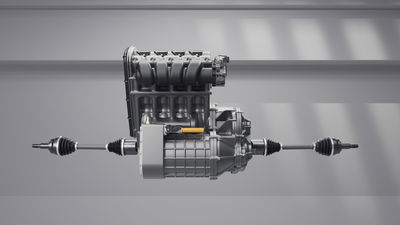The Hybrid Car Is Already Dying And Here's Why It Makes Us Happy

The swing towards hybridisation was slow, for a long time, and to this day it has never been especially celebrated. Toyota pioneered its self-charging system in the 1990s and most other manufacturers apart from Honda laughed. They said electrification just wasn’t the way forward. Honda developed its own system, and soon the Prius and Insight were mocked by the West.
Then, over a decade later, Europe got serious over emissions. So too did the US under the Obama administration. Manufacturers panicked and realised there was no way they could meet the new targets without electrification. Suddenly, everyone was releasing hybrids and trying to claim them as their own innovation while Toyota (and Lexus) sat back and rolled its eyes.

But, all of a sudden, the tide has turned again just as hybrids had started to make significant inroads into showroom ranges. The future of the tech looks to have stalled. The BMW M3, which credible rumours from a few years ago said was going to be a hybrid, is now not. The 2020 M3 will actually have a rear-driven chassis at the entry level and one above that with an M5-derived switchable four-wheel drive setup.
Likewise, the definitive hot hatch, the Volkswagen Golf GTI, was tipped for hybrid assistance from 2020. But as we reported this week, it’s not happening any more. A top-level management decision has been reversed and the eighth iteration of the car will carry on more or less as we know the seventh.

So why the U-turns? Simply put, the emissions savings from hybrids aren’t enough to warrant the development costs. The solution, only ever seen as temporary, is being abandoned altogether because, for all the money ploughed into it, it can’t do the job. Europe has a fleet average emissions target of 95g/km by 2020 and 2021, as the rules are phased in. Some brands are nowhere near that.
It seems like only last year that a super-economical car would clock 99g/km in the emissions tests. The advent of the tougher WLTP emissions programme has pushed those old NEDC figures way back up, though, and getting down to two figures has become a proper headache for combustion engines.

Development pace has sped up, thankfully. Now the most efficient petrol-electric self-charging Prius hybrid will only cough out 78g/km on the WLTP test (up from 70g/km NEDC), and the Japanese brand’s fleet of relatively small cars will balance out. For manufacturers like BMW and Volkswagen, which make more larger, heavier cars than Toyota, hybrid simply can’t tip the balance far enough. So it’s being partly abandoned. It’s not worth the increase in showroom price and the corresponding fall in sales (or profit margins) if it doesn’t help achieve the business goals.
One of those goals is avoiding the massive EU fines for missing that 95g/km average. It makes more financial sense for car makers who sell big numbers in Europe to jump straight to pure EVs as quickly as possible, conveniently just ahead of the new limits coming into force. Only with the help of a few zero-emission models is the 95g/km within reach for BMW, Volkswagen and others.

So it’s bye-bye to closed hybrid systems. You were actually quite effective, while you lasted. Your plug-in brethren will continue in your stead, in some cases, or you can go to your retirement knowing that the world has moved beyond you; you played your part but it’s a different game now.
There’s a side-effect of all this that makes us very happy indeed. The decision to avoid forcing mild hybrid and plug-in hybrid systems into everything means that many of our favourite cars, the ones we would buy with our own money, have a stay of execution. With no batteries or extra wiring to worry about, cars like the Golf GTI and the M3 can keep getting lighter, sharper and more exciting.

Yes, they’ll eventually make way for electric performance cars, and yes, when the time comes we’ll no doubt have the usual EV praise and complaints. But in the short and medium term, it looks like those mid-range performance heroes are here to stay just as they are. If that’s not worth a party popper or two, I don’t know what is.














Comments
Isn’t that mean internal combustion engines will die quicker too?
One word: Hydrogen
I don’t know I was rather excited at the possibility for technology such as that used in the La Ferrari, McLaren P1, and Porsche 918 Spyder to trickle down into vehicles for the average consumer
It still can, in the form of battery and motor technology.
I like the concept of a hybride, because you can be silent, fast and drive a long distance without much more hassle than you have driving a diesel or combustion engine. It only makes the car very heavy.
im glad the hybrid car is dying because that means the prius will too and thatll be epic 😎
Don’t know about that. It’s been going 20 years! If any hybrid will survive it’ll be the bloody prius.
The Prius isn’t even a bad car. Dare i say, it’s a good car! Even great! Certain cars have specialties, like a La Ferrari being fast or a Rolls Royce being comfortable. The Prius is no different. It gets the most MPG for your buck.
Side note. I’m pretty sure most people hate the Prius because Jeremy Clarkson doesn’t like it and they cannot form their own opinions
Well the new ones look a lot less daft than the old ones.
so does that mean hybrids are not coming on then?
as James May put it in the latest iteration of the grand tour, lighter means less fuel and less emissions.
Make cars lighter.
Remove rubbish they dont need such as: heated and electrically adjusted seats; self opening and closing doors; automatic park. Reduce the size of the wheels; CARS DONT NEED 20” RIMS!! 17s are a good compromise of style, comfort and efficiency.
Additionally, REDUCE THE NUMBER OF SUVS ON THE ROAD. They are large and heavy with wide tyres and big engines. none of these things help with fuel consumption or emissions.
But heated seats are useful
I’m actually quite sad to hear this. I genuinely wanted manufacturers to stop turbocharging everything and just going hybrid. Although I still like diesel engines, I think they will only belong in long distance transport vehicles. I’m not very keen on EVs, but in towns, taxis, delivery vans, buses should all be electric, just for the sake of having a cleaner air, especially in big cities (with the downside that batteries harm the environment quite a lot). Also, I think that all manufacturers should have some cheap electric econoboxes for people to travel to work and back home again, and that’s pretty much it. For the rest of the vehicles, that won’t travel more than let’s say 15 000 km/year (9000 miles), they should just use ICEs, but obviously, further developed - no camshafts (remember, Koenigsegg?), variable compression ratios and so on. Another thing that could be done is to stop making so many stupid SUVs and crossovers. They are absolutely horrible vehicles for people who think they are the kings of the road if they drive a slightly taller and a lot uglier and more embarassing to drive Golf. You only buy an SUV if you actually need a lot of space, you tow stuff and/or you go off-road quite often. The end. Also, cars should get rid of all unnecessary equipement on them. I mean, there are many useful features on new cars, such as ACC, parking sensors, airbags, ABS, ESP and so on, but there are so many useless ones. If you can’t drive without lane assist, you do not belong on the road. Driving schools should prepare future drivers a lot more than they do now.
A fellow commenter with accidental essay syndrome, I see
How about instead of no camshafts, remove the valves and camshafts by using rotary valves
SAME
I partly agree and disagree with you. It’s perfect that they dont find their way into small performance cars like a GTI or M3. But they shouldn’t disappear out of heavy luxus cars like the Lexus GS450h, Porsche Panamera e-hybrid or Mercedes S-class e. So the hybrid dying out isn’t all that good.
Hey what about a system where you have the same co2 emmission like a electric car the refueling time of a petrol engine and a way to store electric energy over a long distance? Cant be done? Well think again we could have that if we would invest in hydrogen cars and not that stupid electric stuff!
because we haven’t figured out fusion reactors yet, and so we dont have a major supply or demand for pure hydrogen yet
Hybrids will still have a life as a range extender. I think companies are switching to electric faster than technology is allowing electric cars to be universally practical. So I would expect more hybrids once all the companies switch primarily to electric.
Pagination